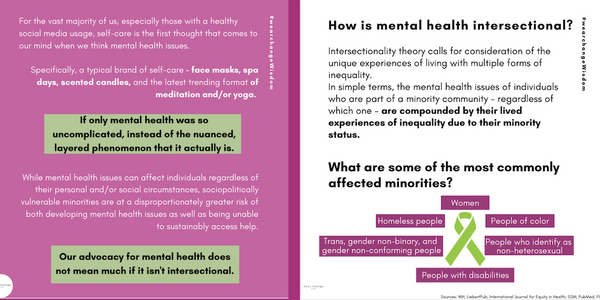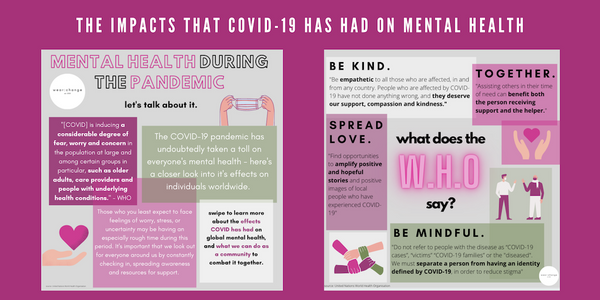Mental Health Awareness

On this edition of the wear:change blog, we discuss the stigma surrounding mental health. 1 in 4 individuals will suffer from mental health issues during their lifetime (Johns Hopkins), but the stigma around mental illness continues to persist and often leads to individuals feeling isolated or stereotyped. It's a constant battle between themselves and their thoughts, feelings and emotions, and often we don't see when someone is struggling. To the people who are struggling to find their voice, we aim to help them create a platform. If you are reading this and struggle with mental health of any kind, the entire team of wear:change would like to offer our support to you, and let you know that you are not alone. Together, we can raise awareness and help our loved ones know that they are not alone and to encourage those who want to speak up.
To those of us wondering what we can do to help when we feel helpless:
- Check in on your friends, your loved ones, people close to you. We never know when they may be struggling. Just a simple “hey, how are you” can make someone feel wanted.
- It is difficult to understand what they must be going through, and that's okay, be gentle, let them take their time, don’t rush them. They may not be able to express themselves all the time, watch out for body language and let them know that you will be there no matter what.
- Many individuals struggling with mental health may feel like a burden and hence not want to open up, or be scared to become close to people. Let them know that you enjoy their presence and that they are valued for who they are.
To the ones that are fighting, you are not alone.
- Remember that on days it may hit too hard, don’t see asking for help as a weakness, we are here for you, we all need help sometimes, it’s only human.
- It's okay to feel unmotivated or overwhelmed with the uncertainty that surrounds us, or even sadness or despair right now. Don't be too hard on yourself on days where all you can do is take care of yourself. Better days will come.
- It is okay to be affected by the past, take your time to heal and overcome, growth is not linear.
- We are proud of you for surviving all the difficult times you have faced. What you went through or are going through, does not make you weaker, it only makes you stronger.
While mental health affects many, it can more drastically affect individuals who do not have sustainable access to help, such as sociopolitically vulnerable minorities, hence when advocating for mental health it is important to ensure this advocacy is intersectional.

Intersectionality is a significant issue when it comes to mental health as it highlights how multiple forms of inequality can be combined to magnify and create distinctive challenges that often reflect discrimination and disadvantage. Essentially, the mental health strains felt by those in minority communities are “compounded by their lived experiences of inequality due to their societal status.” Some of these minorities include but are not limited to: women, people of color, individuals who identify as LGBTQ+ those with disabilities, and homeless individuals. The challenges these individuals face often cause them to face a greater level of mental health distress as well as impact access to treatment, progression of their treatment and adequate care.
Hence, as a society, we need to be more cognizant about the prevalence of mental health issues, particularly the fact that they ;p coincide with minority issues. This reiterates the importance of being understanding and kind to those around us!

Furthermore, the Covid-19 pandemic has further exasperated mental health conditions. The WHO highlights how "[COVID] is inducing a considerable degree of fear, worry and concern in the population at large and among certain groups in particular, such as older adults, care providers and people with underlying health conditions." This increased fear, worry and concern can intensify the symptoms of those coping with anxiety conditions.

It is important to practice self care to help balance and keep good mental health."Self-Care is what people do for themselves to establish and maintain health, and to prevent and deal with illness. It is a broad concept encompassing hygiene (general and personal), nutrition (type and quality of food eaten), lifestyle(sporting activities, leisure etc), environmental factors(living conditions, social habits, etc.) socio-economic factors(income level, cultural beliefs, etc.) and self-medication." - WHO.

If you are looking for assistance, here are some mental health resources available in Singapore:
Institute of Mental Health (IMH)
Specialise in:all mental health areas, such as depression, anxiety, addictions, antisocial behaviours, suicidal thoughts, and psychotic, sleep and eating disorders.
Ph: 6389 2000 Email: imh_appt@imh.com.sg
Limitless.sg
Specialise in:depression, self-harm, poverty and social inequalities, trauma, self-image and behavioural challenges.
Website: https://www.limitless.sg/contact
Silver Ribbon
Specialise in:personal struggles which affect appetite, concentration, health, mood, relationships, sleep, studies, or work performance.
Ph: 6386 1928 Email: info@silverribbonsingapore.com
SG Association for Mental Health
Specialise in: creative services, outreach or rehabilitation through activities such as group art therapy, psychosocial rehabilitation, and run recovery programs for adults and youths.
Ph: 6255 3222 OR 1800-283-7019
Samaritans of Singapore (SOS)
Specialise in:suicidal thoughts, coping with a suicide loss of a loved one, and immediate and long-term emotional support relating to suicide.
Ph: 1800-221 4444
Counselling and Care Centre
Specialise in:family therapy, couple/marital therapy, pre-marital counselling, individual psychotherapy, child-focused therapy, and counselling on sexuality and sexual issues.
Ph: 6536 6366
